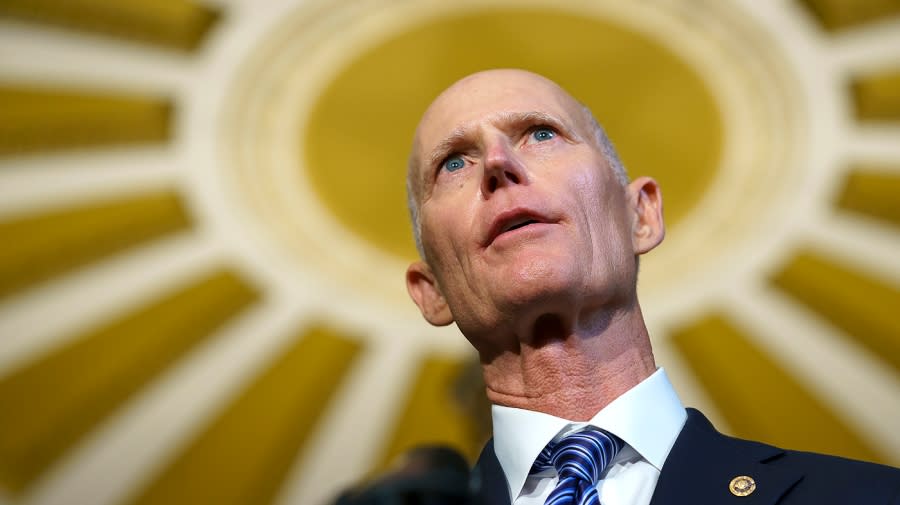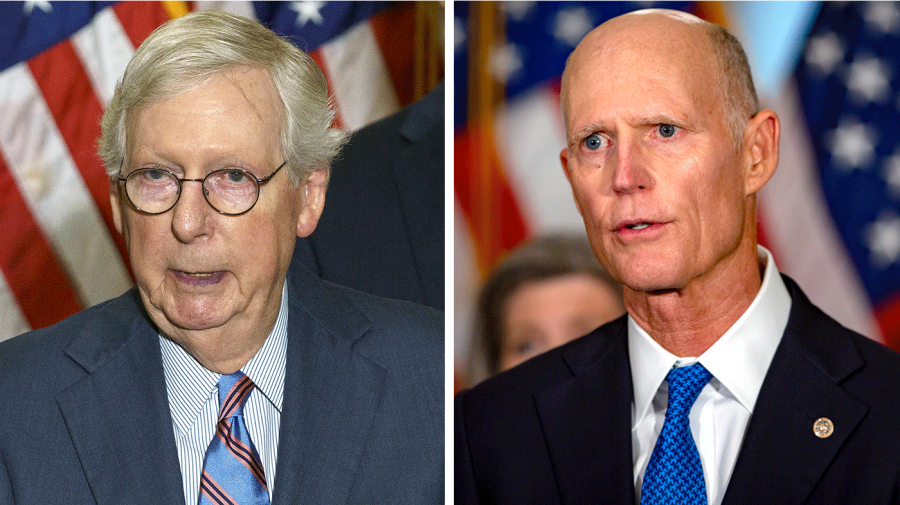Chatter grows over potential Rick Scott GOP leadership challenge to Mitch McConnell
- Oops!Something went wrong.Please try again later.
- Oops!Something went wrong.Please try again later.
The prospect of Senate Republicans picking up as many as two to five seats in the midterms is fueling chatter of a showdown between Senate Republican Leader Mitch McConnell (Ky.) and National Republican Senatorial Committee (NRSC) Chairman Rick Scott (Fla.) in a race to serve as Senate majority leader.
Scott stoked speculation about his leadership ambitions on Sunday, when he refused to rule out challenging McConnell, who says he has the votes to win.

Sen. Rick Scott (R-Fla.) addresses reporters after the weekly policy luncheon.
“He might do it. I hope he doesn’t,” said a Senate Republican strategist, when asked if Scott could challenge McConnell.
Scott declined to endorse McConnell as majority leader Sunday during an interview with NBC’s “Meet the Press.”
Asked by host Chuck Todd if he planned to run for leader if Republicans win the Senate majority, Scott said, “I’m not focused on anything except getting a majority Tuesday night.”
Todd then interrupted him midsentence to interject: “That’s a nonanswer.”
“It’s a possibility,” the television host concluded, which Scott didn’t dispute.
Senate Republican insiders say Scott’s silence on the question of whether he might challenge his colleague is puzzling, because he told CBS News in mid-February that he would “absolutely” vote for McConnell to serve another term as leader.
“I can’t imagine there will be a leader besides Mitch McConnell,” Scott said at the time.

Senate Minority Leader Mitch McConnell, R-Ky., speaks during a news conference.
Since then, their relationship has become strained over differences on political and fundraising strategy.
McConnell pointedly told reporters on March 1 that he, not Scott, would be majority leader if Republicans captured the Senate. McConnell wasn’t happy that Scott released his own 11-point plan, which called for sunsetting all federal legislation after five years.
“Now let me tell you what will not be part of our agenda: We will not have as part of my agenda a bill that raises taxes on half of the American people and sunsets Social Security and Medicare within five years,” McConnell said at the time.
Scott, who was standing behind McConnell at the beginning of the press conference, walked away from the podium before McConnell took questions.
A second Republican strategist said Scott may be trying to position himself as a potential rival to McConnell to boost his own national profile, even if he doesn’t challenge him for the top leadership job.
“One of his advisers said a fight for McConnell is good for him, and he’s trying to raise his profile to see what his choices are post-NRSC,” the strategist said, noting that Scott is also thought to be weighing a run for president in 2024.
Scott is also a loyal ally of former President Trump, who has feuded with McConnell and is likely to run for president again. That would be Scott’s major advantage against McConnell.
McConnell is no longer on speaking terms with Trump, who attacks him on a regular basis. The ex-president called on Republicans last week to “impeach” McConnell if he supported a plan to eliminate the federal debt ceiling.

Trump, center, walks with McConnell, left, and Sen. Roy Blunt, R-Mo., right, on Capitol Hill in Washington on March 10, 2020.
Scott, in contrast, traveled to Mar-a-Lago in mid-April — a few weeks after clashing with McConnell over his 11-point plan — to give the former president a handsome silver bowl, which he called the NRSC’s first “Champion of Freedom Award.”
Scott has consistently sounded more confident than McConnell about the prospects of Republicans picking up seats and control of the chamber. He told The Hill last month that he saw a pathway to Republicans controlling as many as 55 Senate seats next year.
In early August, McConnell predicted on Fox’s “Special Report” that “we’re likely to have a very, very close Senate still, with us up slightly or the Democrats up slightly.”
In mid-August, McConnell said there was “probably a greater likelihood the House flips than the Senate” because “Senate races are just different” and “candidate quality has a lot to do with the outcome.”
That statement was interpreted as a veiled criticism of some of the Senate GOP candidates, who were falling short of expectations in fundraising and polling.
Scott appeared to lash out his leader by writing a scathing op-ed in the Washington Examiner in which he excoriated fellow Republicans for “trash-talking” GOP candidates. He called it “an amazing act of cowardice” and “treasonous to the conservative cause.”

Scott later insisted he was not talking about McConnell but instead about “people that do anonymous quotes to the liberal media.”
Several Republican senators told The Hill earlier this year that they expect McConnell to win another term as Republican leader because of his strong relationships within the caucus. They added that there had been no effort by Scott or anyone else to lay the groundwork for a leadership race.
But challenges to a party leader are usually waged secretly, with behind-the-scenes machinations often not getting light until the last moment.
The election could increase the power of Scott and Trump in the Senate Republican Caucus, as Trump has endorsed several Senate GOP candidates who, if they win, would have a vote on a future GOP leader. They include Ted Budd in North Carolina, J.D. Vance in Ohio, Adam Laxalt in Nevada, Mehmet Oz in Pennsylvania, Herschel Walker in Georgia and Blake Masters in Arizona.
McConnell, meanwhile, is losing a group of loyal allies who will retire at the end of the year. Republican Sens. Richard Shelby (Ala.), Roy Blunt (Mo.), Richard Burr (N.C.), Rob Portman (Ohio), Pat Toomey (Pa.) and Ben Sasse (Neb.), who could all be expected to reliably vote for McConnell, won’t be serving in the Senate next year.
Still, McConnell is a master tactician and prodigious fundraiser who will also be able to take credit for a GOP Senate victory. He has raised more than $380 million to help Senate Republican candidates through two outside groups: the Senate Leadership Fund and One Nation. That’s substantially more money than Scott has raised through the NRSC or than Trump has funneled to Senate GOP candidates.
McConnell also has strong support from other members of the Republican leadership, including Senate Republican Whip John Thune (S.D.), Senate Republican Conference Chairman John Barrasso (Wyo.) and Sen. John Cornyn (Texas), the former party whip who now serves as an adviser.
“Is there a chance he could run? Maybe. If he thinks that he has a shot, then he might run as somebody who is going to be able to take some credit for some wins in the election,” Brian Darling, a Republican strategist and former Senate aide, said of Scott
“But the bottom line is the Senate is a club and I don’t see him beating McConnell for leader. There just don’t seem to be the votes there to take McConnell out as leader,” he said. “Maybe he leverages another position in leadership.”
For the latest news, weather, sports, and streaming video, head to The Hill.

